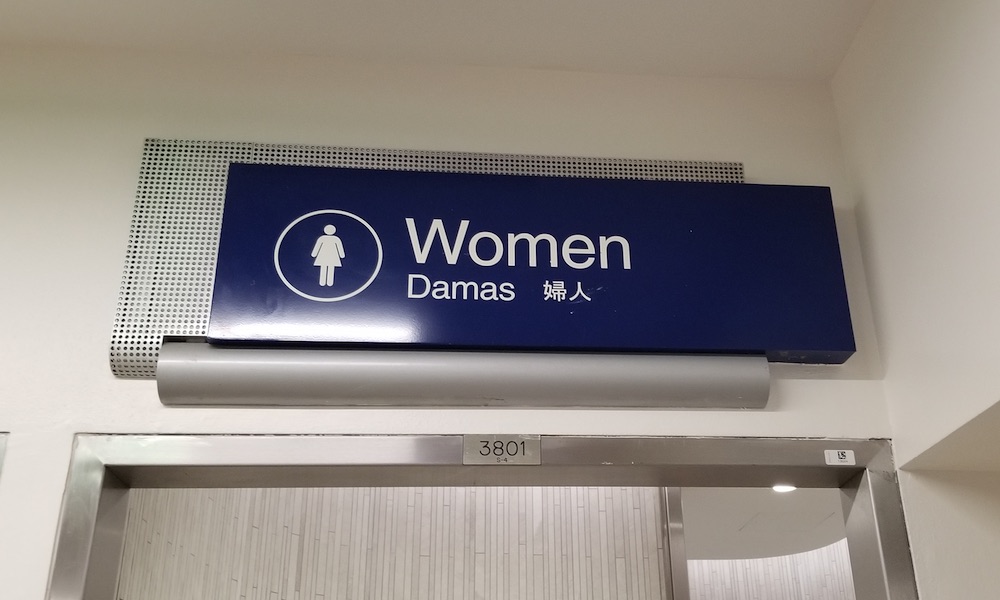Ladies' room
« previous post | next post »
Photograph taken at the Los Angeles International Airport:
The Chinese says fùrén 婦人 ("married woman; lady"), making it seem like a high-class establishment. That is underscored by their using the traditional form of 婦, rather than the simplified 妇.
Usually it's just nǚ 女 for "women" and nán 男 for "men".
[Thanks to Yuanfei Wang]

Grover Jones said,
February 27, 2020 @ 12:54 pm
Spanish is "higher-class" than the English as well. "Damas" is akin to "Ladies" (which is not uncommon in English for such facilities).
Jonathan Smith said,
February 27, 2020 @ 5:30 pm
Japanese?
Kai said,
February 27, 2020 @ 6:31 pm
Good thought, I agree it might be Japanese, especially at LAX. It would explain the use of the traditional character. However I am pretty sure that the rest of the analysis still applies – Japan also usually uses 女.
https://jisho.org/word/%E5%A9%A6%E4%BA%BA
Kate Bunting said,
February 27, 2020 @ 11:05 pm
Indeed, in the UK public toilets are commonly referred to as 'the Ladies' and 'the Gents'.
David Soler said,
February 28, 2020 @ 3:48 am
Yes, it is Japanese. Of course, those are Chinese characters, but that combination is only common in Japan. (Chinese might not even understand it if they heard it in casual conversation!) The Japanese pronunciation is "fujin."
J.W. Brewer said,
February 28, 2020 @ 6:35 am
My recollection from living as a boy in Tokyo (some decades ago now) is that: a) 女 was ubiquitous in this context, and was together with 男 among the first kanji it was very practically useful for a gaijin boy to learn to recognize, so as to go through the right door and avoid the wrong door; and b) if high-class synonyms were in use they were sufficiently rare that to the best of my recollection I don't recall ever going through the wrong door because it wasn't marked 女 and I failed to understand the substitute kanji being used as a high-class synonym. I guess I can't quite "remember what I've forgotten" with full reliability but I don't think 婦 was among the kanji I ever mastered.
JoshR said,
February 28, 2020 @ 2:34 pm
"Fujin" is not unusual as a restroom marker, being roughly analogous to "Ladies'". In this case, it's contrasted with 殿方 (tonogata), meaning "Gentlemen". It does have something of a more high-class feel (both in earnest or ironically). I think it is more commonly seen in department stores denoting the women's apparel section and similar cases where something is denoted as being for a particular gender, although there it is contrasted with 紳士 shinshi.
And of course, gynecology is 婦人科 fujinka.
y said,
February 28, 2020 @ 5:16 pm
Just let to let you guys know that the characters for men's restroom at LAX are 紳士.